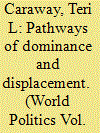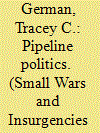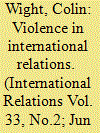| Srl | Item |
| 1 |
ID:
154258


|
|
|
|
|
| Summary/Abstract |
Although India is hailed as harbouring a green-field competition regime, its competition law jurisprudence is older than many of its counterparts in developing countries. This article traces the evolution of competition law in India, details the economic aspects of competition and anticompetitive behaviour and reviews the challenges of dealing with crossborder competition issues.
|
|
|
|
|
|
|
|
|
|
|
|
|
|
|
|
| 2 |
ID:
111845


|
|
|
|
|
| Publication |
2012.
|
| Summary/Abstract |
Legacy unions-formerly state-backed unions that survived democratic transitions-are one of the most persistent legacies of authoritarian rule. While usually successful in maintaining their preeminent position, legacy unions have in some cases been overtaken by competing unions. Deploying a set of paired comparisons of legacy unions that entered the transition with similar legacies but experienced different fates-Indonesia with South Korea and Poland with Russia-this article examines why some legacy unions continued to dominate (Indonesia and Russia) and others did not (South Korea and Poland). The author identifies four pathways of change: endurance (Indonesia), attrition (South Korea), hegemony (Russia), and rupture (Poland). Several features of the transition context propelled legacy unions down distinct pathways of change-the widespread mobilization of workers outside of state-sponsored unions early in the transition, partisan links, and the structure of union competition.
|
|
|
|
|
|
|
|
|
|
|
|
|
|
|
|
| 3 |
ID:
089332


|
|
|
|
|
| Publication |
2009.
|
| Summary/Abstract |
The development of new energy export infrastructure, which bypasses Russia, has constituted a fundamental element of US and European engagement with the Caucasus in recent years, but has, to some extent, undermined Moscow's hegemony in an area that it considers to be its own 'strategic backyard'. This article examines the validity of the argument that Russian military intervention in Georgia in August 2008 was motivated by so-called 'petro-politics' and a desire to punish Tbilisi for its overt pro-Western orientation. It analyses the significance of the pipelines that transit Georgia and their implications for European energy security, together with the potential consequences of the 2008 conflict for future infrastructure developments.
|
|
|
|
|
|
|
|
|
|
|
|
|
|
|
|
| 4 |
ID:
167189


|
|
|
|
|
| Summary/Abstract |
This article examines change and continuity in the function, role and moral judgement of violence in international relations. In terms of change, the conclusions are mostly pessimistic if the aim is the complete eradication of political violence. The control of violence, on the other hand, and the ability to hold those who employ it to increasing moral and legal standards is perhaps one of the most significant changes in international relations from 1919 to 2019. However, this does not mean that violence has been replaced or even transformed. Violence is constitutive of the political. It is the first and the last word in politics. This is the continuity of violence. Violence, of which war is only the most visceral expression, has not been transformed or replaced, but rather it has been displaced into legal systems, institutional orders and new forms of conflict. Inter-state war may be in decline, but intra-state conflict is rising. To develop this argument, the article argues that change can only be understood as change against a horizon of continuity.
|
|
|
|
|
|
|
|
|
|
|
|
|
|
|
|